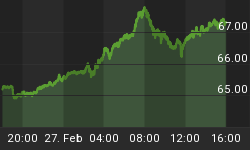The GDP numbers out yesterday, which showed economic growth at 3.5% in the third quarter, brought a deafening chorus from public and private economists who all agreed that the recession is officially over. With such a strong report, they are happy to tell us that not only has the Fat Lady finished her aria, but she has left the building and is sipping champagne in the bath. As usual, it falls on me to rain on the parade.
Even the giddiest commentators admit that the upside GDP surprise resulted almost entirely from government interventions. But, by pushing up public and private debt, expanding government, deepening trade deficits, and pushing down savings rates, these interventions have succeeded only in putting our economy back on an unsustainable path of borrowing and spending. Accordingly, they have prevented the rebalancing necessary for long-term health. Could there be a simpler illustration of trading long-term pain for short-term gain?
Rather than asking these pre-K economists to make such a three dimensional leap, it may be easier just to give them a brief history lesson.
During the decade that corresponds to the Great Depression, annual GNP expanded for six years and contracted for four. After nose-diving in the early years of the decade, GNP turned positive in 1934 and then logged three more years of solid growth (the four year average annual growth rate was 8.5%). But does anyone really believe the Great Depression ended in 1934, when the economy first stopped contracting? Unemployment reached 19% in 1938, nearly the peak of the entire Depression, almost a full decade after the stock market crashed! Why will we be so much luckier this time around?
The unpopular truth is that rather than curing the economy, government stimulus has made it sicker. The Bush Administration and the Greenspan Fed pursued this policy recipe in the 2002-2003 recession. The result was four years of phony growth, greater global imbalances, and the development of unsupportable asset bubbles. Clearly we have learned nothing from those mistakes.
Third quarter 'growth' was largely driven by a 23% increase in residential construction (the largest quarterly increase since 1986) and a 3.1% increase in consumer spending, which included a 22% jump in durable goods purchases - mostly automobiles - and 2.3% gain in government spending. Since the increase in consumption outpaced the increase in production, the trade deficit expanded, reversing the positive trend for most of 2008 and 2009. Because the increase in spending outpaced the increase in incomes, the savings rate plunged from 4.9% in the prior quarter to 3.3%.
The sizzling numbers for housing and autos resulted from heady cocktail of policy stimulants: near-zero interest rates, government-guaranteed mortgages, Federal Reserve purchases of mortgaged-backed securities, tax credits for homebuyers, bailouts for auto finance companies and 'cash for clunkers' for car buyers.
But the last thing our economy needs is for scarce resources to be wasted through uneconomical incentives.
If the government were not 'stimulating the economy,' higher interest rates and falling home prices would have hamstrung residential construction. That would have been the right move. Instead, based on the false economic signals of the 'stimulus,' we continue to build houses for which no legitimate demand exists.
The same is true for cars. Because of stimulus money, Americans are buying cars that they otherwise would not have. In a free market, the money would have been used for a more constructive purpose. Perhaps it would have been saved, used to pay off existing debt, or spent on a less expensive mode of transport, like a used motorcycle.
The economy ran into a wall in 2008 because consumers bought houses and cars that they really could not afford. That is why the institutions that provided the loans, such as banks, Fannie & Freddie, and GMAC, went bankrupt. It should be obvious that the solution to our economic problems will not be found by redoubling these efforts. This is akin to a drunk having a few more drinks in order to get sober!
A recent article in the Wall Street Journal detailed the myriad ways in which Senators and Congressman are now compelling General Motors to make business decisions that are solely driven by the legislators' own political considerations, not the best interest of the taxpayers who now own the company. Such a dynamic is now underway in nearly every facet of our economy. An efficient allocation of resources - the only path to economic growth - is only possible when market forces, not Beltway bureaucrats, call the shots.
In the end, this stimulus, just like prior doses, will only worsen the condition it is meant to cure. When it wears off, the resulting recession will be even bigger than the one that everyone assumes has just ended. Until the impulse to fight recessions with government stimulus is quashed, genuine economic growth will never return. A string of ever-worsening recessions will eventually lead to what will be the next Great (Inflationary) Depression. But for now, enjoy the bubbly.
For a more in-depth analysis of our financial problems and the inherent dangers they pose for the U.S. economy and U.S. dollar, read Peter Schiff's 2008 bestseller "The Little Book of Bull Moves in Bear Markets" and his newest release "Crash Proof 2.0: How to Profit from the Economic Collapse." Click here to learn more.
More importantly, don't let the great deals pass you by. Get an inside view of Peter's playbook with his new Special Report, "Peter Schiff's Five Favorite Investment Choices for the Next Five Years." Click here to dowload the report for free. You can find more free services for global investors, and learn about the Euro Pacific advantage, at www.europac.net.















